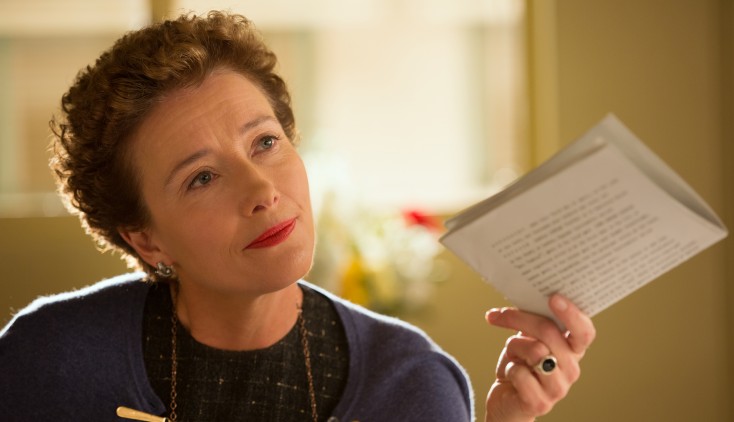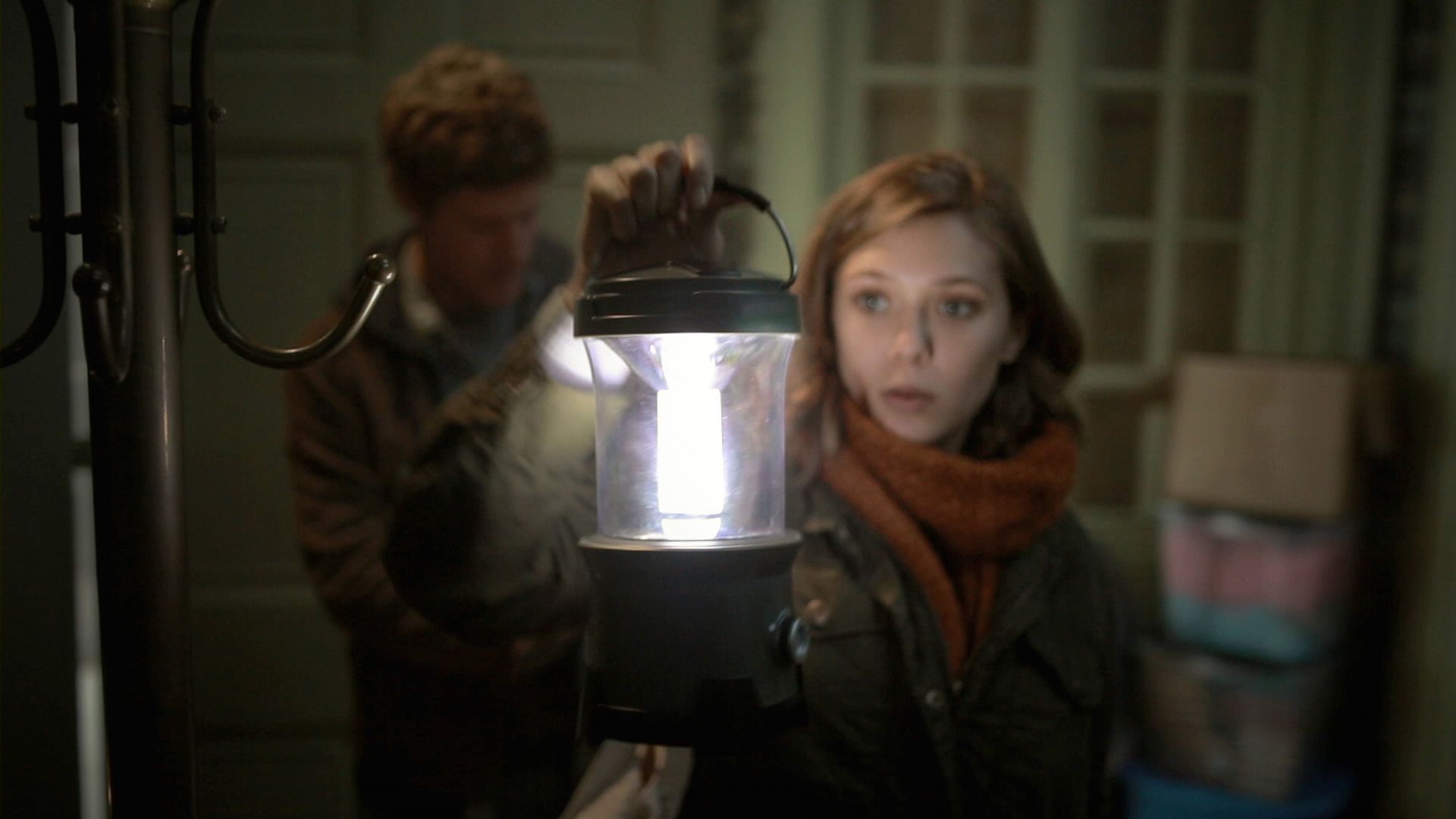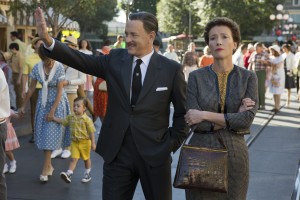
Walt Disney (Tom Hanks) shows Disneyland to “Mary Poppins” author P.L. Travers (Emma Thompson) in Disney’s “Saving Mr. Banks.” ©Disney Enterprises. CR: Francois Duhamel.
By ANGELA DAWSON
Front Row Features
HOLLYWOOD—Emma Thompson knows how to make an entrance. As the renowned British actress arrives for a press conference in the ballroom of a tony Beverly Hills hotel to promote her new Disney movie “Saving Mr. Banks,” she climbs over the dais to her seat rather than walking around. Her stunt is a lot like her film choices—surprising and always entertaining.
Surrounded by her A-list co-stars Tom Hanks and Colin Farrell, the two-time Oscar winner (for acting in “Howards End” and as a screenwriter on “Sense and Sensibility”) talks about taking on the iconic role of “Mary Poppins” creator P.L. Travers. Travers, of course, was the Australian author who was reluctant to have her work adapted into a film. It took Walt Disney (depicted by Hanks) himself to convince her to give his company the movie rights to the story. It took some 20 years of haggling and courting by the movie mogul to convince Travers to cooperate.
“Saving Mr. Banks” explores the two-week sojourn when Travers, facing personal financial setbacks, agreed to meet with Disney and his production team that would ultimately make one of the most beloved family films of all time. The dramedy is directed by John Lee Hancock, based on a screenplay by Kelly Marcel and Sue Smith.
Thompson is no stranger to magical nannies, having played a less attractive caregiver in 2005’s “Nanny McPhee.” She spoke about playing Travers, her association with nannies and more.
Q: Why do you suppose your character, Pamela Lyndon Travers, could be so hurtful and mean, so much fun and even kind of irresistibly adorable in this film?
Thompson: That is the first time I’ve heard her called “irresistibly adorable,” but I’ll take it. Is it not rather nice for all of us, who’ve been so well brought up, and we’re all so bloody polite all the time—Americans particularly—to see someone being rude? It’s bliss, isn’t it? We act quite a lot of the time in sort of conflict with what we really feel.
Q: You’re playing a character that, unlike Tom Hanks’ Walt Disney, has a rather low public awareness. What were the little breadcrumbs that you used to follow the trail to get to the essence of who she was, rather than to try to do an imitation of her?
Thompson: I liked that you used “breadcrumbs,” because it makes me think of (mythological Greek hero) Theseus and the Minotaur, and the fact that P.L. Travers was so fascinated with myth. She was a searcher all her life. It was very breadcrumb-y, my search for her. She went everywhere you can imagine. She was like going into a maze, and around some corners I’d find this terrible monster. And around another corner you’d find a sort of beaten child. So she was the most extraordinary combination of things. I suppose that was the scary thing, because in films, we often get to play people who are emotionally or at least morally consistent in some way. And she wasn’t consistent in any way. You would not know what you would get from one moment to the next. You could have had a very close moment with her on one day—I heard this from her friends—and then the next day, they might have gone to see her and she would have treated them (badly). It’s like that moment that (screenwriter) Kelly (Marcel) created and invented with Paul Giamatti’s character, where she says, “You’re the only American I’ve ever liked.” And he says, “Oh, really? How fascinating. Why?” And she says, “I don’t want to tell you any more about that. Now you’re just asking too much. Go away.”
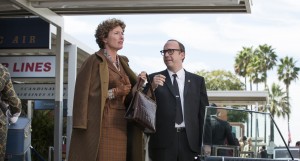
P.L. Travers (Emma Thompson) and Ralph (Paul Giamatti), in Disney’s “Saving Mr. Banks.” ©Disney Enterprises. CR: Francois Duhamel.
Q: You have played a nanny before in “Nanny McPhee,” and here you play the author of another fictional nanny?
Thompson: (looking on quizzically) Yes. That was my “I’m intrigued” face. Sorry. Did it come out wrong? Sometimes that happens.
Q: Did that at all affect your approach to this film?
Thompson: I’ll tell you what is interesting. P.L. Travers used to talk a lot about Buffalo Bill. And while I was playing her, and discovering what she was, I found out that she referred to Mary Poppins in very similar ways. There was a spot of Zen mastery in the way in which she worked. Women have traditionally been locked out of the superstructures or the power structures that we all live in. Buffalo Bill’s a very good example, because I’ve always thought that “Nanny McPhee” was essentially a Western, only set in a domestic environment, and (P.L. Travers) felt the same way about “Mary Poppins.” So there’s a very real connection in the sense that the outsider comes into the place where there is difficulty and solves the problem using unorthodox methods, and then must leave. That’s a Western. And because women don’t have that kind of power, the Western form, which is what she would have called an essential myth, emerges in the female world in the nursery. So that’s what comes to mind. I don’t think I’ve answered your question at all. Do forgive me. But it was the most interesting thing I thought that I could tell you.
Q: P.L. Travers made it very clear in the film what she thought of Disney’s “Mary Poppins,” but how do you think she would have responded to “Saving Mr. Banks?”
Thompson: I’ve been asked this question a few times, and I reckon this is a woman who kept on saying, “I don’t want anything. I don’t want a biography. I don’t want anything like that. I don’t want anyone to do or know anything about me.” Meanwhile, she kept everything she wrote and sent it the archives at Brisbane University. So, she felt, I’m certain, that she was an important contributor to the artistic, to the culture, and wanted to have it preserved. That’s what she would say about this, is, “Absolutely ridiculous film. I have no relationship whatsoever to what was happening. But, you know, it’s about me. I thought that the clothes were really rather nice.” I think that’s what she would have said.
Q: Have you ever been obsessed with a book or a character, and hope maybe to produce it someday as a film?
Thompson: As a child, it was always Sherlock Holmes with whom I was deeply in love, and who I wanted really to be. That’s the problem, isn’t it? If you’re a female, a lot of the heroic models are, in fact, male. So, one of my first questions to everybody as I was getting older is, “Who’s the female hero? Who is she? What does she do? What does she actually do?”
Q: In “Love, Actually” and in this, you have two memorable scenes where you have no dialogue. Is that harder on you to do those scenes because there are no words to fall back on? Or is it easier for you to get those emotions across because you don’t have to worry about the words?
Thompson: Scenes without words are bliss to do. Reacting scenes are wonderful to do, not because one is frightened of words or learning words or using words. Of course not! But just because you’re not so active somehow. It’s not even that you’re passive, but you’re just responding. You’re talking about the scene at the end, right? We didn’t know how to do that quite right because (my character) is having a huge reaction. I mean, huge. It’s like an elemental reaction she’s never had before in her life. The thing that made it work was the clip from “Mary Poppins.” That’s what did it. So that’s what I was responding to. That was nice.
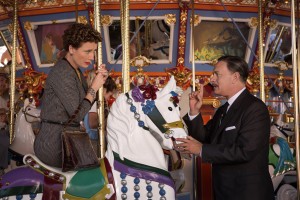
P.L. Travers (Emma Thompson), left; Walt Disney (Tom Hanks), right, in Disney’s “Saving Mr. Banks.” ©Disney Enterprises. CR: Francois Duhamel.
Q: Is there a possibility of another “Nanny McPhee” movie?
Thompson: A second one? (She clears throat dramatically). We had a lovely time making it, and it went down very well in my country. But when we came here and we did what we’re doing now, which is sort of a big old two-week tour of the United States, it was just wonderful because I had never been to so many states before and everybody was very enthusiastic. The film played beautifully (in preview screenings) so when I got to the end of the tour, I was pretty tired. I was in New York packing my bags to go home when, literally, the phone rang. I said, “Oh, hello. How’s it going?” This was opening weekend. “Well, uh…” I said, “What? What?” “Well, it’s, you know, the box office, it’s not as good as we wanted it to be.” I said, “Okay. What do you mean?” “We projected that it would take $14 million, and it only took $9.7 (million).” I don’t understand what that means so I go, “Gosh, $9.7 million? That seems like quite a lot of money, really. But, anyway, you seem to be suicidal.” So I better take that as evidence that there won’t be another one. And that’s how it works. It doesn’t matter how good the movie is. What matters is what it takes during the opening weekend. It’s slightly distressing sometimes.

